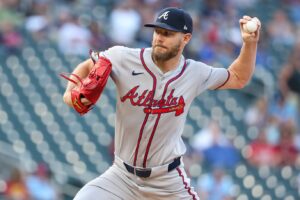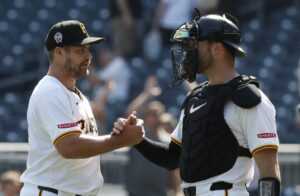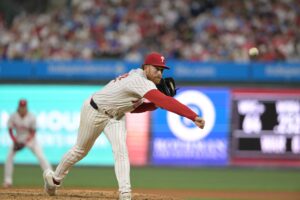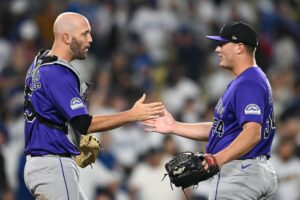Once more, the Atlanta Braves have defied expectations. They have single-handedly shifted the story surrounding the world of baseball. The phrase “kill the narrative” has rung true on social media accounts from Alpharetta to Charleston. In doing so, the fans have spoken their intentions: namely, they are tired of being consistently written off. However, thanks to the efforts of unlikely heroes Eddie Rosario and Tyler Matzek, they don’t have to be anymore. The idea of Atlanta sports teams having some type of hex placed upon them is slowly dying out. Thankfully so, as fans of the Atlanta Braves gear up for the city’s biggest sporting event since Super Bowl 52.
For fans of the Los Angeles Dodgers, however, the mood is significantly different. Down 3-1 in the series, it appeared as if the team would mount a comeback. After last season, they had good reason to believe such things. Déjà vu might have struck. However, some untimely hitting woes plagued them throughout. Their pitching, outside of Game Four, was okay. That said, there are some who question manager Dave Roberts’s decision to use the bullpen so much. Combined, the Dodger bullpen pitched over 32 innings. By comparison, their starters went around 17. So, a conjoining of missed offensive opportunities and pitching mishaps might have cost them. There is another possibility, though. That being that the Atlanta Braves were simply the better team over six games.
Game One: Walk-Off #1
Game One began with Max Fried taking on Los Angeles reliever Corey Knebel. The Dodger bullpen had been a strength all season long. Among the entire majors, they ranked second in ERA (3.16) and had the third-lowest WHIP (1.19). Only the San Francisco Giants and Tampa Bay Rays had bullpens as effective. However, the Atlanta Braves sought to kill this narrative as well. Knebel fired a wild pitch in the first inning, giving the Braves a 1-0 lead. Fried would run into trouble, and the Dodgers grabbed a 2-1 advantage. Then, in the fourth inning, Austin Riley launched a home run into the Atlanta night, sending the crowd into a frenzy. This tie lasted until Riley faced Blake Treinen in the bottom of the ninth. Once more, the crowd was pushed overboard as Riley cracked a base hit to score Ozzie Albies and win Game One.
Game Two: A Second Walk-Off
For Game Two, the Braves sent young hurler Ian Anderson to the mound. The Dodgers countered with postseason veteran Max Scherzer on short rest. It looked bleak for the Braves at the beginning when Corey Seager launched a two-run homer. As always, though, the team battled back and former Dodger Joc Pederson crushed a two-run shot of his own. In the top of the seventh, Chris Taylor picked up a two-RBI hit and put the Dodgers back in front. The battle wasn’t over yet, though. Albies and Riley put together back-to-back RBI hits to tie it in the eighth. Then, in the ninth, Rosario came to the plate with Dansby Swanson in scoring position. He laced one back up the middle and under Seager’s glove, winning the game and giving the Braves a 2-0 series advantage.
Game Three: A Devastating Loss
Game Three was a heartbreaker for the Atlanta Braves. Taking a 5-2 lead into the eighth inning, manager Brian Snitker sent Luke Jackson in to pitch. This move was not unwarranted as Jackson had been one of the team’s best relievers all year. He’d pitched to a 1.98 ERA in 71 games with a whopping 224 ERA+. The Division Series had been kind to him as well (3 1/3 IP, 3 H, 0 R, 3 K). Unfortunately, those statistics were not reflected by his performance in the Championship Series. In the blink of an eye, the Dodgers had tied the game on a Cody Bellinger three-run homer. Three batters later, Mookie Betts gave Los Angeles a permanent lead with a double. Kenley Jansen struck out the side in the ninth and that was all she wrote.
Games Four & Five: Offenses and the Atlanta Braves Hex
Games Four and Five were both offensive blowouts. In Game Four, the Braves clobbered the Dodgers 9-2 behind the hot bats of Rosario and Adam Duvall. Game Five was the opposite affair, as the Dodgers touched up Fried and won 11-2. So, the series shifted back to Atlanta with a lot of people believing in the hex. After all, the Braves are an Atlanta area sports team. The recent postseason woes of franchises like the Falcons and Hawks push the myth. It’s fairly common to get on a social media account and witness the now infamous “28-3” meme. We may also speak of how the Hawks had a chance in the Eastern Conference Finals last year and did not complete things. This was all before the Braves had an unforgettable Game Six.
Game Six: Rosario Becomes an Atlanta Braves Legend
The team trusted young Ian Anderson with its destiny. He started Game Seven of the NLCS last season and lost. However, this year, he was sharp enough to get through four innings. The score was tied heading to the bottom of that frame. However, the scorching hot bat of Eddie Rosario would quickly change that, lifting a Walker Buehler cutter into the seats. The three-run dinger put the Braves in front 4-1, and they never looked back. That said, the heroics were not over. When Jackson came in and gave up a run in the seventh inning, things looked bleak. Then, with runners on second and third and nobody out, Tyler Matzek was called upon. He promptly struck out the side, including both Betts and Albert Pujols. From then on, the bullpen pitched shut down baseball, and Swanson made a terrific defensive play to end the series.
A Statistical Anomaly
The statistics from this series do not favor the Atlanta Braves very much. The pitching had a worse ERA and a marginally better WHIP. Offense-wise, the Dodgers had more homers and walks to go with a higher team slugging average and on-base percentage. Overall, though, the Braves had three more crucial hits as a team, along with a batting average that was ten points higher. They also had series MVP Rosario, who massacred baseballs to the tune of a .560 average. His three homers, nine RBI, and staggering 1.647 OPS were definite contributions to success. That said, he wasn’t alone. Matzek pitched an amazing series, going 1-0 with an ERA of three and a WHIP of 0.500. These two men added over 31% to the Braves’ chances of winning the series. In short, they could not have done it without them.
Main Photo:
Embed from Getty Images
Players Mentioned:
Eddie Rosario, Tyler Matzek, Max Fried, Corey Knebel, Austin Riley, Blake Treinen, Ozzie Albies, Ian Anderson, Max Scherzer, Corey Seager, Joc Pederson, Chris Taylor, Dansby Swanson, Luke Jackson, Cody Bellinger, Mookie Betts, Kenley Jansen, Adam Duvall, Walker Buehler, Albert Pujols






